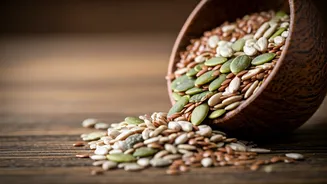Chia Seeds: Small Wonders
Chia seeds, tiny but mighty, are rich in soluble fiber, which forms a gel-like substance in your digestive tract. This slows down the absorption of cholesterol
from food. The high fiber content also helps to bind cholesterol and remove it from the body. Moreover, chia seeds provide a good dose of omega-3 fatty acids, crucial for reducing inflammation and supporting heart health. These seeds are incredibly versatile, easily added to smoothies, yogurt, or sprinkled on salads. Including chia seeds regularly in your diet could offer a simple, delicious way to support heart health and lower cholesterol levels. They contribute to improved cholesterol profiles by facilitating the removal of excess cholesterol and supporting overall cardiovascular well-being. Using these seeds consistently can make a substantial difference, helping you work toward a healthier heart.
Flax Seeds: Heart's Ally
Flax seeds are a nutritional powerhouse, renowned for their ability to promote heart health. They are a treasure trove of alpha-linolenic acid (ALA), a type of omega-3 fatty acid that is beneficial for heart health. ALA helps reduce inflammation in the body and can assist in lowering triglyceride levels, another risk factor for heart disease. These seeds also contain soluble and insoluble fiber. Soluble fiber helps lower LDL cholesterol, often called “bad” cholesterol, while insoluble fiber promotes healthy digestion. Consuming ground flax seeds is more effective than whole seeds, as it allows the body to access the nutrients more readily. Integrate flax seeds into your diet by adding them to your morning oatmeal, mixing them into baked goods, or blending them into your smoothies. Regular consumption of flax seeds can significantly support heart health, contributing to a healthier lifestyle.
Hemp Seeds: Protein Boost
Hemp seeds, often called hemp hearts, stand out as a complete protein source, offering all nine essential amino acids. These seeds are filled with essential fatty acids, including omega-3 and omega-6, in a ratio that is beneficial for heart health. A balanced intake of these fatty acids aids in reducing inflammation, preventing the buildup of plaque in arteries, and supporting overall cardiovascular function. Hemp seeds are easy to incorporate into various meals. They can be sprinkled on salads, added to yogurt, or blended into smoothies, making them a simple and convenient addition to your diet. The balanced fatty acid profile and complete protein content make hemp seeds an excellent choice for anyone looking to support their heart health and boost their nutritional intake.
Pumpkin Seeds: Nutrient Power
Pumpkin seeds, often overlooked, are packed with nutrients that can greatly benefit heart health. They are a good source of magnesium, which is critical for regulating blood pressure. Proper magnesium intake can help to relax blood vessels, thus reducing blood pressure and decreasing the workload on the heart. Additionally, these seeds offer antioxidants and phytosterols, both of which contribute to lowering cholesterol levels and protecting the heart from oxidative stress. Pumpkin seeds are a versatile snack that can be enjoyed roasted, raw, or added to salads and trail mixes. Consuming these seeds regularly provides a delicious way to support heart health by managing blood pressure and protecting against oxidative damage, contributing to long-term cardiovascular well-being.
Sunflower Seeds: Healthy Fats
Sunflower seeds are an excellent source of vitamin E and phytosterols, both essential nutrients for heart health. Vitamin E acts as an antioxidant, protecting cells from damage, while phytosterols help to lower LDL cholesterol by blocking its absorption in the gut. These seeds also contain healthy fats that support overall cardiovascular function. Sunflower seeds are a great snack on their own or can be added to salads, cereals, or baked goods for added texture and nutrition. Regular consumption of sunflower seeds contributes to a healthier heart by providing antioxidants, lowering cholesterol, and supporting healthy fats intake, which aids in maintaining cardiovascular health.
Sesame Seeds: Mineral Rich
Sesame seeds are not only flavorful but also beneficial for heart health. They are rich in lignans, a type of fiber that can help lower cholesterol levels. These seeds also provide minerals like magnesium and copper, both essential for cardiovascular function. Magnesium helps regulate blood pressure, while copper supports healthy blood vessels. Sesame seeds can be easily incorporated into your diet by sprinkling them on salads, using them in stir-fries, or adding them to baked goods. They offer a delightful taste and texture, along with a host of health benefits. Consistent use of sesame seeds helps improve cholesterol profiles and promotes the overall health of the heart through their essential nutrients, which supports better cardiovascular health.













